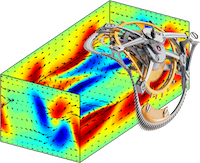

What would be good preparation courses? The ChaosBook.org is advanced and quirky, with its own perspective of what it means to develop a theory of chaos, turbulence and a quantum field theory of strongly nonlinear fields. Of necessity, the first 8 preparatory weeks are something that any scientiest should know, but focused on what is needed for the next 8-week course, and omitting some very important tools, of which the absence of bifurcation theory is the most glaring one. If you feel that the level of this course is too high, you might consider working through some of these first:
Applied Dynamical Systems by Robert Ghrist is compact, well suited to self-study, with plenty of videos. twitter.com/robertghrist
Complexity Explorer provides online courses related to complex systems science. They offer a video [download] button for locations where YouTube is blocked. The videos are texted in a number of languages. Their Introduction to Dynamical Systems and Chaos is elementary and very pedagogical, with lots of multiple choice quizes. Length: 8 weeks. Workload: 3-6 hours per week. Amusingly, there are only two references which this course and ChaosBook.org have in common. There is almost no overlap with their complexity course. They have good FAQ and overview which, inter alia, explains how to use YoutTube HTML5 player to speed up the videos.
Nonlinear Dynamics and Chaos is a set of videos of Steven Strogatz 2014 lectures, a good complement to self-study of his book - it is all about bifurcations. twitter.com/stevenstrogatz
Physics of Information and Computation by Jim Crutchfield's is not an online course, but well suited to self-study, with plenty of videos, overheads and readings.
Chaos, Fractals, & Dynamical Systems, an Alligood, Sauer and Yorke based course by Chris Danforth is not an online course, but well suited to self-study, with plenty of videos. twitter.com/nonperiodicflow
Nonlinear Differential Equations: Order and Chaos by Paul Blanchard is an introduction to ordinary differential equations, in dynamical systems spirit using qualitative, numerical, and symbolic techniques.
Johannes Jaeger Module 6 of "Beyond Networks" is a 3 lectures gentle introduction into dynamical systems, with biological flavor.
Advanced resources
Recurrent Flows: The Clockwork Behind Turbulence Spring 2017 KITP online lectures will give you some feel for contemporary research in the dynamical theory of turbulence.